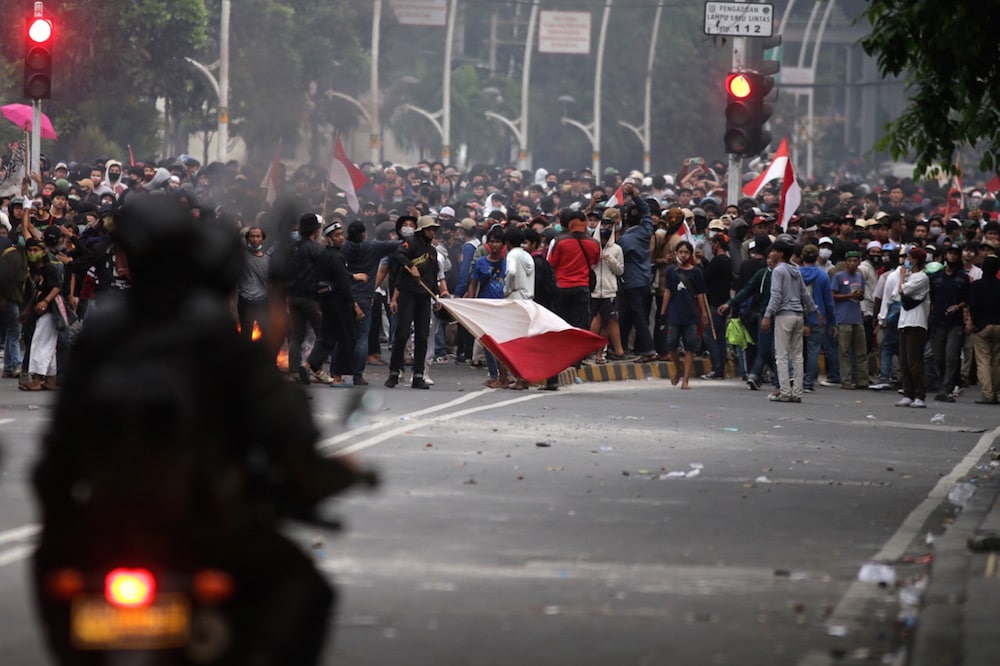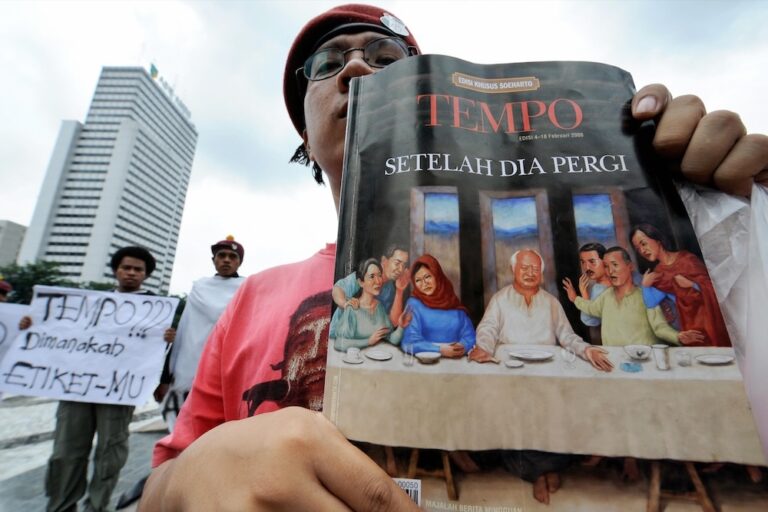In response to the omnibus bill, street protests immediately broke out in more than three dozen cities, with police arresting hundreds of protesters and physically assaulting or destroying the equipment of at least 28 journalists.
This statement was originally published on hrw.org on 15 October 2020.
Indonesia’s government should revise a new jobs law to meet international human rights standards, Human Rights Watch said today. The omnibus bill on job creation, which the House of Representatives passed on October 5, 2020, restricts labor rights and dismantles environmental protections, including by threatening Indigenous people’s access to land and the country’s declining rainforests.
The new law significantly reduces protections for workers under the 2003 labor law, including on minimum wages, severance pay, vacation, maternity benefits, and health and child care, and abolishes legal protections in permanent employment contracts. The law also weakens existing environmental laws and legal protections for Indigenous groups, raising concerns about land grabbing. The roughly 1,000-page law was largely drafted by the business community, with little consultation from labor unions and other affected groups.
“Creating jobs and attracting investment are important goals, but they should not come at the expense of basic labor rights and the rights of Indigenous peoples,” said Andreas Harsono, senior Indonesia researcher at Human Rights Watch. “The Indonesian government should review the hastily passed law, organize a proper public consultation, and revise all articles that violate rights.”
The omnibus bill was passed in the face of mounting opposition from labor unions, civil society organizations, scientists, and religious groups over its feared impact on the environment and labor rights. Street protests immediately broke out in more than three dozen cities, with police arresting hundreds of protesters, mostly in Jakarta and Surabaya. Some protests turned violent, with several bus stops destroyed in Jakarta, while the Indonesian Legal Aid Foundation said that police used excessive force against protesters.
The Alliance of Independent Journalists reported that police physically assaulted or destroyed the equipment of at least 28 journalists, mostly photographers, working during the protests in Bandung, Jakarta, Palu, Samarinda, Semarang, Surabaya, and Tanjung Pinang. On October 8, police arrested 6 journalists in Jakarta. They were released without charge 24 hours later.
President Joko “Jokowi” Widodo first proposed an “omnibus law” to boost Indonesia’s regional competitiveness in October 2019. He said he wanted to simplify the application process for business licenses across all business sectors, including land acquisition permits, to create more jobs, boost infrastructure development, and attract foreign investment.
In November, Economic Affairs Coordinating Minister Airlangga Hartarto asked the Indonesian Chamber of Commerce and Industry (Kamar Dagang dan Ekonomi Indonesia, Kadin) to help set up a task force to draft the bill. The members included prominent businessmen, but no members of trade unions or environmental groups. Hartarto submitted the bill to parliament on February 8, but due to the Covid-19 pandemic, the House of Representatives only began deliberations in April.
Public consultation was lacking, and it was difficult for the public to obtain an official version of the draft bill, which contains about 185 articles in 15 chapters. The Indonesian Legal Aid Foundation and many other groups protested the lack of transparency. In August, Indonesia’s National Commission on Human Rights (Komnas HAM) called on the government to “halt their deliberations because the process is rife with irregularities and constitutes a violation of the country’s laws on the legislative process.”
Environmental groups have warned that less stringent requirements for environment impact assessments and other measures weakening environmental protections under the omnibus law will worsen deforestation.
Indonesia’s Indigenous Peoples’ Alliance of the Archipelago stated that the omnibus law provisions starkly contradict a bill to protect Indigenous peoples’ rights and simplify the process of recognizing customary lands that has been debated in parliament since 2009 without being adopted.
The omnibus law also appears to contradict the 2013 Constitutional Court ruling that Indigenous peoples should have control of customary forest and that the government should demarcate and exclude customary forests from government control.
A 2019 Human Rights Watch report examined how a patchwork of weak laws, exacerbated by poor government oversight, and the failure of mostly oil palm plantation companies to fulfill their human rights responsibilities have adversely affected Indigenous peoples’ rights to their forests, livelihood, food, water, and culture.
“The biggest content of the law is about investment, and it gives almost nothing to protect Indigenous people’s customary lands,” said Rukka Sombolinggi, the chairwoman of the Indigenous Peoples’ Alliance of the Archipelago. “This law will make it easier for companies to grab land.”



